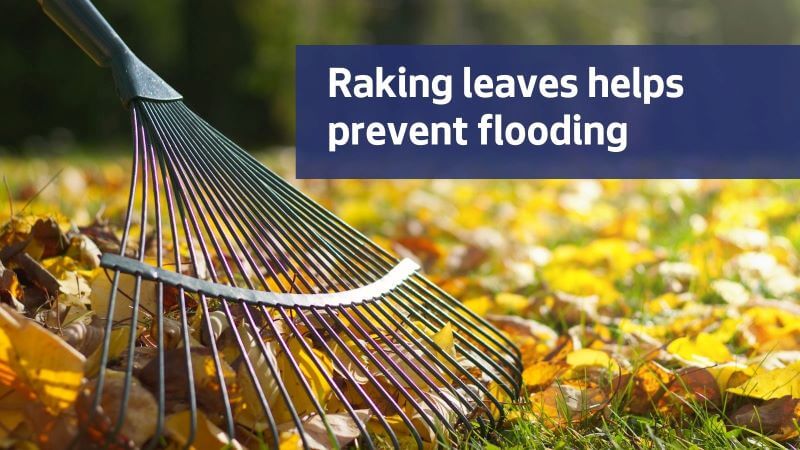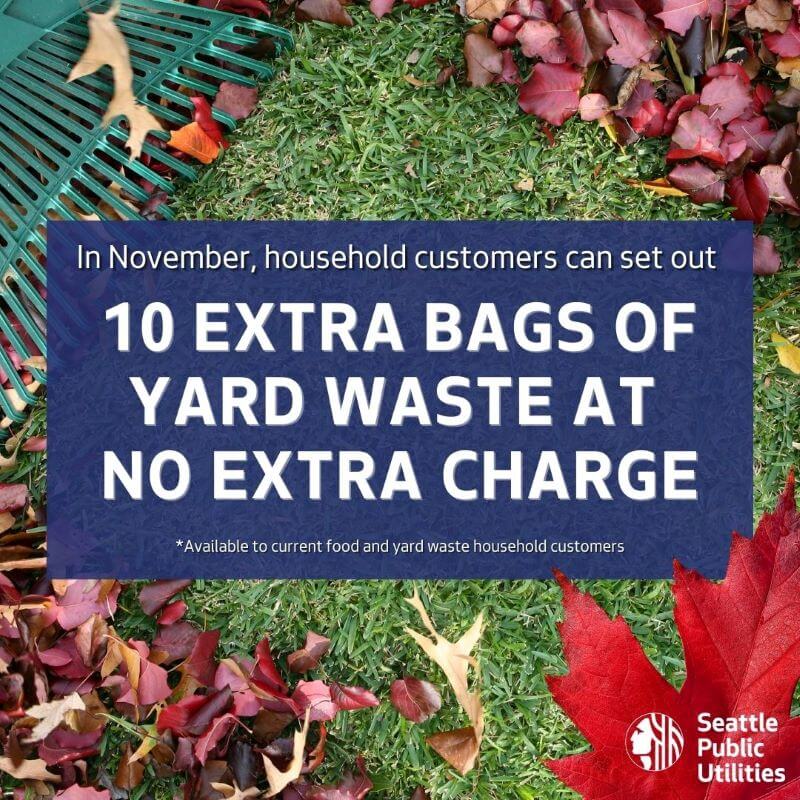
Fall is here, and that means beautiful, brilliant shades of red, orange, yellow, and green are blanketing yards, sidewalks, and streets. While lovely to look at, the leaves can pose problems.
While it’s been a relatively dry fall, we know the regular rains will return. The falling leaves, paired with an increase in stormy, wet weather, can lead to clogged storm drains, causing water to back up and flood neighborhood streets and sidewalks.
But there’s good news for SPU customers who receive regular yard waste collection services: we will pick up those extra leaves at no additional charge throughout November.
What Can You Do to Help Reduce Flooding in Your Neighborhood?

Rake Your Leaves
You can help prevent clogged storm drains by raking fallen leaves in your yard, sidewalk, or parking strip. Think of it as a workout that helps you and your neighbors before the next storm!
Once gathered, leaves can be used as a great source of free mulch for your garden which will decompose over time while improving your soil’s organic content. You can also dispose of them in your food and yard waste cart, and we’ll be happy to collect it for composting.
If you find that you have more leaves and yard waste than can fit in your food and yard waste cart, SPU has you covered!
SPU yard waste customers can set out up to 10 bags of extra yard waste every collection date all November long at NO EXTRA CHARGE!
Extra yard waste must be contained either in kraft paper bags or placed in an extra container that is clearly marked to indicate it contains extra yard waste. Please make sure your extra yard waste collection bags or container only contain yard waste, not food waste. Fallen branches and twigs can be set out for extra collection as well. These can be tied into bundles up to 4 feet long by 2 feet in diameter and tied with fiber twine. Do not use wire, nylon cording, or plastic banding. Learn more about setting out extra yard waste.
Help Keep Storm Drains Clear
Another way you can help reduce flooding in your neighborhood is by safely clearing leaves and other debris from storm drains. Using a rake and dustpan or a shovel (not your hands!), make sure to work from the sidewalk instead of standing in the street. Once collected, leaves and other debris cleared from storm drains should go in your regular garbage, not your yard waste container due to the possibility of garbage and pollutants found on the road.
Those who want to go the extra mile can join the many volunteers across the city who keep local storm drains clear of debris when they sign up to volunteer with the Adopt-A-Drain (AAD) Program! This tool lets you adopt a storm drain in your neighborhood and provides a valuable service to your community. Volunteers can request supplies and find other support materials as well.
While customers do their part, SPU crews prepare for potential problems by:
- Checking critical drainage system infrastructure (culverts) especially in areas of the City that are prone to flooding to make sure they are clear of trees, leaves, and debris and ready to handle the elements.
- Assessing staffing levels when heavy rains are forecasted, and if needed, adding crews to be on standby to respond. If the City experiences heavy rains and impacts are widespread, we prioritize work with consideration to areas most severely affected and critical and vulnerable customers.
- Working with SDOT, if necessary, to have streets swept of leaves and debris to prevent flooding
Stay Safe During Wet Weather
As the weather changes, learn more about how you can get prepared, be safe, and stay informed this storm season.
If you see flooding or sewer backups, report it by calling SPU’s Operations Response Center at (206) 386-1800. When you call, provide your name, address, contact information, the address of the issue, and general information about the issue.
If you come across a clogged storm drain that can’t be cleared or is unsafe to clear, let us know! Using the Find It Fix It app, you can ensure that the right department will be alerted to the issue.
Thanks for raking your leaves and reducing flooding across Seattle, and be sure to sign up for Alert Seattle texts, emails, and phone alerts for emergencies near your home, work, or school.